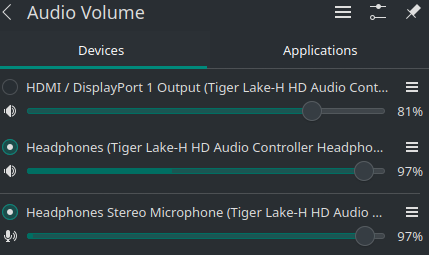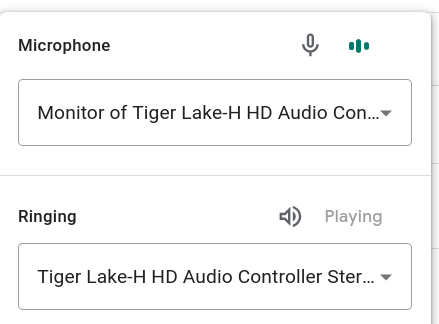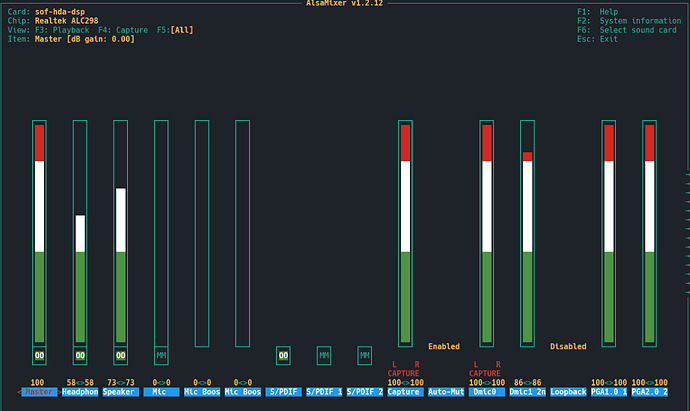I have a relatively new install of Manjaro.
Normally I use it with an external USB soundcard. However I am traveling and I can’t get any sound out of my onboard Tiger Lake HD sound system.
I know this card worked on my previous opensuse install, and it still works on the dual booted windows.
The current system also works with my bluetooth earbuds.
I have tried switching the sound settings between the three available options for this card, none work, but the first is the only one with a headphone option, which I need.

I have also tested with VLC, manually setting the audio output device.
I can see the output bar moving in the task bar volume widget, but no sound out of my headphones.:

inxi -Fazy output:
System:
Kernel: 6.9.12-3-MANJARO arch: x86_64 bits: 64 compiler: gcc v: 14.2.1
clocksource: tsc avail: acpi_pm
parameters: BOOT_IMAGE=/boot/vmlinuz-6.9-x86_64
root=UUID=34637cd0-76ee-4bcd-be93-d49b5d11f6f0 rw quiet splash
udev.log_priority=3
Desktop: KDE Plasma v: 6.0.5 tk: Qt v: N/A info: frameworks v: 6.5.0
wm: kwin_x11 vt: 2 dm: SDDM Distro: Manjaro base: Arch Linux
Machine:
Type: Laptop System: Micro-Star product: GE66 Raider 11UE v: REV:1.0
serial: <superuser required> Chassis: type: 10 serial: <superuser required>
Mobo: Micro-Star model: MS-1543 v: REV:1.0 serial: <superuser required>
part-nu: 1543.1 uuid: <superuser required> UEFI: American Megatrends LLC.
v: E1543IMS.120 date: 10/28/2021
Battery:
ID-1: BAT1 charge: 69.0 Wh (97.2%) condition: 71.0/95.0 Wh (74.7%)
volts: 16.3 min: 15.2 model: MSI BIF0_9 type: Li-ion serial: N/A
status: not charging
Device-1: hidpp_battery_0 model: Logitech MX Master 3S serial: <filter>
charge: 90% rechargeable: yes status: discharging
CPU:
Info: model: 11th Gen Intel Core i7-11800H bits: 64 type: MT MCP
arch: Tiger Lake gen: core 11 level: v4 note: check built: 2020
process: Intel 10nm family: 6 model-id: 0x8D (141) stepping: 1
microcode: 0x52
Topology: cpus: 1x dies: 1 clusters: 8 cores: 8 threads: 16 tpc: 2
smt: enabled cache: L1: 640 KiB desc: d-8x48 KiB; i-8x32 KiB L2: 10 MiB
desc: 8x1.2 MiB L3: 24 MiB desc: 1x24 MiB
Speed (MHz): avg: 3688 min/max: 800/4600 scaling: driver: intel_pstate
governor: powersave cores: 1: 3688 2: 3688 3: 3688 4: 3688 5: 3688 6: 3688
7: 3688 8: 3688 9: 3688 10: 3688 11: 3688 12: 3688 13: 3688 14: 3688
15: 3688 16: 3688 bogomips: 73744
Flags: avx avx2 ht lm nx pae sse sse2 sse3 sse4_1 sse4_2 ssse3 vmx
Vulnerabilities:
Type: gather_data_sampling mitigation: Microcode
Type: itlb_multihit status: Not affected
Type: l1tf status: Not affected
Type: mds status: Not affected
Type: meltdown status: Not affected
Type: mmio_stale_data status: Not affected
Type: reg_file_data_sampling status: Not affected
Type: retbleed status: Not affected
Type: spec_rstack_overflow status: Not affected
Type: spec_store_bypass mitigation: Speculative Store Bypass disabled via
prctl
Type: spectre_v1 mitigation: usercopy/swapgs barriers and __user pointer
sanitization
Type: spectre_v2 mitigation: Enhanced / Automatic IBRS; IBPB: conditional;
RSB filling; PBRSB-eIBRS: SW sequence; BHI: SW loop, KVM: SW loop
Type: srbds status: Not affected
Type: tsx_async_abort status: Not affected
Graphics:
Device-1: Intel TigerLake-H GT1 [UHD Graphics] vendor: Micro-Star MSI
driver: i915 v: kernel alternate: xe arch: Gen-12.1 process: Intel 10nm
built: 2020-21 ports: active: DP-1,eDP-1 empty: DP-2 bus-ID: 00:02.0
chip-ID: 8086:9a60 class-ID: 0300
Device-2: NVIDIA GA106M [GeForce RTX 3060 Mobile / Max-Q]
vendor: Micro-Star MSI driver: nvidia v: 550.107.02
alternate: nouveau,nvidia_drm non-free: 550.xx+ status: current (as of
2024-09; EOL~2026-12-xx) arch: Ampere code: GAxxx process: TSMC n7 (7nm)
built: 2020-2023 pcie: gen: 4 speed: 16 GT/s lanes: 16 bus-ID: 01:00.0
chip-ID: 10de:2520 class-ID: 0300
Device-3: Bison Integrated Camera driver: uvcvideo type: USB rev: 2.0
speed: 480 Mb/s lanes: 1 mode: 2.0 bus-ID: 3-13:6 chip-ID: 5986:1160
class-ID: 0e02 serial: <filter>
Device-4: USB C Video Adaptor driver: N/A type: USB rev: 2.0 speed: 12 Mb/s
lanes: 1 mode: 1.1 bus-ID: 3-5:3 chip-ID: 25a4:9311 class-ID: 1100
serial: <filter>
Display: x11 server: X.Org v: 21.1.13 with: Xwayland v: 24.1.2
compositor: kwin_x11 driver: X: loaded: modesetting,nvidia
alternate: fbdev,nouveau,nv,vesa dri: iris gpu: i915 display-ID: :0
screens: 1
Screen-1: 0 s-res: 4608x1440 s-dpi: 96 s-size: 1218x380mm (47.95x14.96")
s-diag: 1276mm (50.23")
Monitor-1: DP-1 pos: primary,top-left model: Samsung LS32A70
serial: <filter> built: 2021 res: 2560x1440 hz: 60 dpi: 93 gamma: 1.2
size: 698x393mm (27.48x15.47") diag: 806mm (31.7") ratio: 16:9 modes:
max: 3840x2160 min: 720x400
Monitor-2: eDP-1 pos: bottom-r model: Samsung 0x415f built: 2019
res: 2048x1152 hz: 60 dpi: 151 gamma: 1.2 size: 344x194mm (13.54x7.64")
diag: 395mm (15.5") ratio: 16:9 modes: 3840x2160
API: EGL v: 1.5 hw: drv: intel iris drv: nvidia platforms: device: 0
drv: nvidia device: 1 drv: iris device: 3 drv: swrast gbm: drv: iris
surfaceless: drv: nvidia x11: drv: iris inactive: wayland,device-2
API: OpenGL v: 4.6.0 compat-v: 4.5 vendor: intel mesa v: 24.1.6-arch1.1
glx-v: 1.4 direct-render: yes renderer: Mesa Intel UHD Graphics (TGL GT1)
device-ID: 8086:9a60 memory: 7.48 GiB unified: yes
API: Vulkan v: 1.3.279 layers: 5 device: 0 type: discrete-gpu name: NVIDIA
GeForce RTX 3060 Laptop GPU driver: nvidia v: 550.107.02
device-ID: 10de:2520 surfaces: xcb,xlib
Audio:
Device-1: Intel Tiger Lake-H HD Audio vendor: Micro-Star MSI
driver: sof-audio-pci-intel-tgl alternate: snd_hda_intel, snd_soc_avs,
snd_sof_pci_intel_tgl bus-ID: 00:1f.3 chip-ID: 8086:43c8 class-ID: 0401
Device-2: NVIDIA GA106 High Definition Audio vendor: Micro-Star MSI
driver: snd_hda_intel v: kernel pcie: gen: 4 speed: 16 GT/s lanes: 16
bus-ID: 01:00.1 chip-ID: 10de:228e class-ID: 0403
API: ALSA v: k6.9.12-3-MANJARO status: kernel-api with: aoss
type: oss-emulator tools: alsactl,alsamixer,amixer
Server-1: PipeWire v: 1.2.3 status: active with: 1: pipewire-pulse
status: active 2: wireplumber status: active 3: pipewire-alsa type: plugin
4: pw-jack type: plugin tools: pactl,pw-cat,pw-cli,wpctl
Network:
Device-1: Realtek Killer E3000 2.5GbE vendor: Micro-Star MSI driver: r8169
v: kernel pcie: gen: 2 speed: 5 GT/s lanes: 1 port: 4000 bus-ID: 2f:00.0
chip-ID: 10ec:3000 class-ID: 0200
IF: enp47s0 state: up speed: 1000 Mbps duplex: full mac: <filter>
Device-2: Intel Wi-Fi 6E AX210/AX1675 2x2 [Typhoon Peak]
vendor: Rivet Networks Killer driver: iwlwifi v: kernel pcie: gen: 2
speed: 5 GT/s lanes: 1 bus-ID: 31:00.0 chip-ID: 8086:2725 class-ID: 0280
IF: wlp49s0 state: down mac: <filter>
Info: services: NetworkManager, sshd, systemd-timesyncd, wpa_supplicant
Bluetooth:
Device-1: Intel AX210 Bluetooth driver: btusb v: 0.8 type: USB rev: 2.0
speed: 12 Mb/s lanes: 1 mode: 1.1 bus-ID: 3-14:7 chip-ID: 8087:0032
class-ID: e001
Report: rfkill ID: hci0 rfk-id: 0 state: up address: see --recommends
Drives:
Local Storage: total: 1.84 TiB used: 1.15 TiB (62.6%)
SMART Message: Unable to run smartctl. Root privileges required.
ID-1: /dev/nvme0n1 maj-min: 259:4 vendor: Micron model: 3400 MTFDKBA1T0TFH
size: 953.87 GiB block-size: physical: 512 B logical: 512 B speed: 63.2 Gb/s
lanes: 4 tech: SSD serial: <filter> fw-rev: P7MA000 temp: 48.9 C
scheme: GPT
ID-2: /dev/nvme1n1 maj-min: 259:0 vendor: Western Digital
model: WD Green SN350 1TB size: 931.51 GiB block-size: physical: 512 B
logical: 512 B speed: 31.6 Gb/s lanes: 4 tech: SSD serial: <filter>
fw-rev: 33006000 temp: 24.9 C scheme: GPT
Partition:
ID-1: / raw-size: 195.31 GiB size: 191.19 GiB (97.89%)
used: 57.24 GiB (29.9%) fs: ext4 dev: /dev/nvme0n1p2 maj-min: 259:6
ID-2: /boot/efi raw-size: 300 MiB size: 299.4 MiB (99.80%)
used: 300 KiB (0.1%) fs: vfat dev: /dev/nvme0n1p1 maj-min: 259:5
ID-3: /home raw-size: 758.26 GiB size: 745.3 GiB (98.29%)
used: 522.99 GiB (70.2%) fs: ext4 dev: /dev/nvme0n1p3 maj-min: 259:7
Swap:
Kernel: swappiness: 60 (default) cache-pressure: 100 (default) zswap: yes
compressor: zstd max-pool: 20%
ID-1: swap-1 type: file size: 16 GiB used: 0 KiB (0.0%) priority: -2
file: /swapfile
Sensors:
System Temperatures: cpu: 55.0 C mobo: N/A
Fan Speeds (rpm): N/A
Info:
Memory: total: 16 GiB note: est. available: 15.32 GiB used: 6.06 GiB (39.6%)
Processes: 367 Power: uptime: 7m states: freeze,mem,disk suspend: deep
avail: s2idle wakeups: 0 hibernate: platform avail: shutdown, reboot,
suspend, test_resume image: 6.1 GiB services: org_kde_powerdevil,
power-profiles-daemon, upowerd Init: systemd v: 256 default: graphical
tool: systemctl
Packages: 1424 pm: pacman pkgs: 1414 libs: 396 tools: pamac pm: rpm pkgs: 0
pm: flatpak pkgs: 10 Compilers: clang: 18.1.8 gcc: 14.2.1 alt: 10 Shell: Zsh
v: 5.9 default: Bash v: 5.2.32 running-in: yakuake inxi: 3.3.36





